Filter by
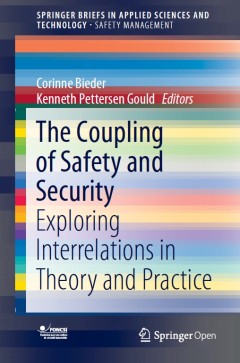
The coupling of safety and security : exploring interrelations in theory and …
This open access book explores the synergies and tensions between safety and security management from a variety of perspectives and by combining input from numerous disciplines. It defines the concepts of safety and security, and discusses the methodological, organizational and institutional implications that accompany approaching them as separate entities and combining them, respectively. T…
- Edition
- -
- ISBN/ISSN
- 9783030472290
- Collation
- viii, 113p. : ill.
- Series Title
- -
- Call Number
- 363.11 COU c
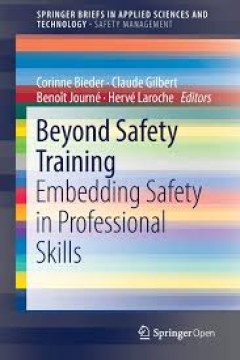
Beyond safety training
This book investigates why, despite more and more resources devoted to safety training, expectations are not entirely met, particularly in the industrial sectors that have already achieved a high safety level. It not only reflects the most precious viewpoints of experts from different disciplines, different countries, with experiences in various industrial fields at the cutting edge of theories…
- Edition
- -
- ISBN/ISSN
- 9783319655260
- Collation
- pages cm
- Series Title
- -
- Call Number
- 363.11 BIE b
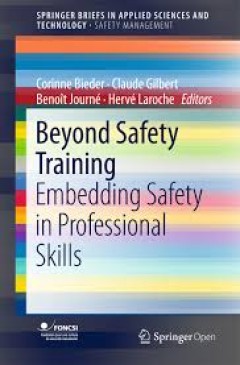
Beyond safety training: embedding safety in professional skills
This book investigates why, despite more and more resources devoted to safety training, expectations are not entirely met, particularly in the industrial sectors that have already achieved a high safety level. It not only reflects the most precious viewpoints of experts from different disciplines, different countries, with experiences in various industrial fields at the cutting edge of theories…
- Edition
- -
- ISBN/ISSN
- 9783319655260
- Collation
- pages cm
- Series Title
- -
- Call Number
- 658 SAF s
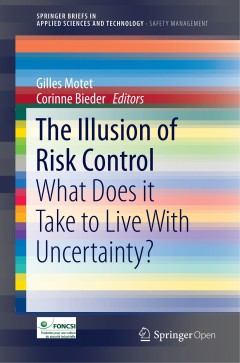
The illusion of risk control : what does it take to live with uncertainty?
This book explores the implications of acknowledging uncertainty and black swans for regulation of high-hazard technologies, for stakeholder acceptability of potentially hazardous activities and for risk governance. The conventional approach to risk assessment, which combines the likelihood of an event and the severity of its consequences, is poorly suited to situations where uncertainty and am…
- Edition
- -
- ISBN/ISSN
- 9783319329390
- Collation
- v, 112p. : ill.
- Series Title
- -
- Call Number
- 658.155 ILL i

Safety cultures, safety models : taking stock and moving forward
The objective of this book is to help at-risk organizations to decipher the “safety cloud”, and to position themselves in terms of operational decisions and improvement strategies in safety, considering the path already travelled, their context, objectives and constraints. What link can be established between safety culture and safety models in order to increase safety within companies carr…
- Edition
- -
- ISBN/ISSN
- 9783319951294
- Collation
- viii, 166p. : ill.
- Series Title
- -
- Call Number
- 363.11 SAF s
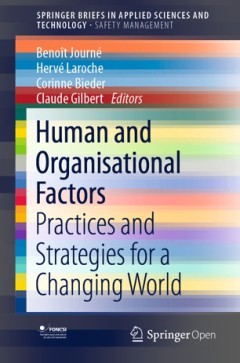
Human and organisational factors : practices and strategies for a changing world
This open access book addresses several questions regarding the implementation of human and organisational factors (HOF) so that recent improvements in industrial safety can be built upon. It addresses sources of frustration in senior management with high expectations of operational recommendations and disquiet on the part of HOF specialists struggling to have an impact on high-level decision m…
- Edition
- -
- ISBN/ISSN
- 9783030256395
- Collation
- viii, 138p. : ill.
- Series Title
- -
- Call Number
- 620.86 HUM h
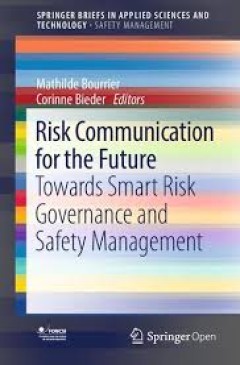
Risk Communication for the Future : Towards Smart Risk Governance and Safety …
The conventional approach to risk communication, based on a centralized and controlled model, has led to blatant failures in the management of recent safety related events. In parallel, several cases have proved that actors not thought of as risk governance or safety management contributors may play a positive role regarding safety. Building on these two observations and bridging the gap betwee…
- Edition
- -
- ISBN/ISSN
- 9783319740980
- Collation
- -
- Series Title
- -
- Call Number
- 363.1 BOU t
 Computer Science, Information & General Works
Computer Science, Information & General Works  Philosophy & Psychology
Philosophy & Psychology  Religion
Religion  Social Sciences
Social Sciences  Language
Language  Pure Science
Pure Science  Applied Sciences
Applied Sciences  Art & Recreation
Art & Recreation  Literature
Literature  History & Geography
History & Geography